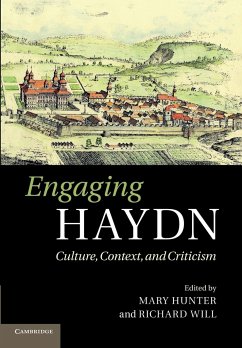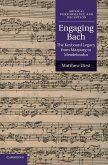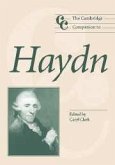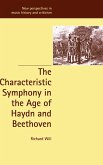Engaging Haydn
Culture, Context, and Criticism
Herausgeber: Hunter, Mary; Will, Richard
Engaging Haydn
Culture, Context, and Criticism
Herausgeber: Hunter, Mary; Will, Richard
- Broschiertes Buch
- Merkliste
- Auf die Merkliste
- Bewerten Bewerten
- Teilen
- Produkt teilen
- Produkterinnerung
- Produkterinnerung
Haydn is enjoying renewed appreciation: this book explores fresh approaches to his music and the cultural forces affecting it.
Andere Kunden interessierten sich auch für
![Engaging Bach Engaging Bach]() Matthew DirstEngaging Bach110,99 €
Matthew DirstEngaging Bach110,99 €![The Cambridge Companion to Haydn The Cambridge Companion to Haydn]() Caryl Clark (ed.)The Cambridge Companion to Haydn59,99 €
Caryl Clark (ed.)The Cambridge Companion to Haydn59,99 €![The Characteristic Symphony in the Age of Haydn and Beethoven The Characteristic Symphony in the Age of Haydn and Beethoven]() Richard James WillThe Characteristic Symphony in the Age of Haydn and Beethoven122,99 €
Richard James WillThe Characteristic Symphony in the Age of Haydn and Beethoven122,99 €![The Cambridge Haydn Encyclopedia The Cambridge Haydn Encyclopedia]() The Cambridge Haydn Encyclopedia163,99 €
The Cambridge Haydn Encyclopedia163,99 €![Haydn and Mozart in the Long Nineteenth Century Haydn and Mozart in the Long Nineteenth Century]() Simon KeefeHaydn and Mozart in the Long Nineteenth Century92,99 €
Simon KeefeHaydn and Mozart in the Long Nineteenth Century92,99 €![Music in the Classical World Music in the Classical World]() Bertil Van BoerMusic in the Classical World190,99 €
Bertil Van BoerMusic in the Classical World190,99 €![Die wichtigsten Musiker im Portrait Die wichtigsten Musiker im Portrait]() Peter Paul KasparDie wichtigsten Musiker im Portrait10,00 €
Peter Paul KasparDie wichtigsten Musiker im Portrait10,00 €-
-
-
Haydn is enjoying renewed appreciation: this book explores fresh approaches to his music and the cultural forces affecting it.
Produktdetails
- Produktdetails
- Verlag: Cambridge University Press
- Seitenzahl: 362
- Erscheinungstermin: 11. November 2013
- Englisch
- Abmessung: 244mm x 170mm x 20mm
- Gewicht: 625g
- ISBN-13: 9781107686137
- ISBN-10: 110768613X
- Artikelnr.: 40951830
- Herstellerkennzeichnung
- Libri GmbH
- Europaallee 1
- 36244 Bad Hersfeld
- gpsr@libri.de
- Verlag: Cambridge University Press
- Seitenzahl: 362
- Erscheinungstermin: 11. November 2013
- Englisch
- Abmessung: 244mm x 170mm x 20mm
- Gewicht: 625g
- ISBN-13: 9781107686137
- ISBN-10: 110768613X
- Artikelnr.: 40951830
- Herstellerkennzeichnung
- Libri GmbH
- Europaallee 1
- 36244 Bad Hersfeld
- gpsr@libri.de
Introduction Mary Hunter and Richard Will; Part I. Cultures of Vocal Music:
1. Fantasy island: Haydn's metastasian 'Reform' opera Elaine Sisman; 2.
Haydn invents Scotland Richard Will; 3. Haydn's English canzonettas in
their local context Katalin Komlós; 4. Revolution, rebirth and the sublime
in Haydn's L'anima del filosofo and The Creation Caryl Clark; 5. 'Achieved
is the glorious work': the creation and the choral work concept Nicholas
Mathew; Part II. Analytical Readings and Rereadings: 6. Imagination,
continuity, and form in the first movements of Haydn's Opus 77 Quartets
Lewis Lockwood; 7. Does Haydn have a 'C-minor mood'? Jessica Waldoff; 8.
Form, rhetoric, and the reception of Haydn's Rondo Finales Michelle
Fillion; 9. Haydn and the Metamorphoses of Ovid Pierpaolo Polzonetti; 10.
Credo ut intelligam: Haydn's reading of the Credo text Tom Beghin; Part
III. Performance: 11. Haydn's string quartet fingerings: communications to
performer and audience Mary Hunter; 12. Haydn's orchestras and his
orchestration to 1779, with an excursus on the times of day symphonies Neal
Zaslaw; Bibliography.
1. Fantasy island: Haydn's metastasian 'Reform' opera Elaine Sisman; 2.
Haydn invents Scotland Richard Will; 3. Haydn's English canzonettas in
their local context Katalin Komlós; 4. Revolution, rebirth and the sublime
in Haydn's L'anima del filosofo and The Creation Caryl Clark; 5. 'Achieved
is the glorious work': the creation and the choral work concept Nicholas
Mathew; Part II. Analytical Readings and Rereadings: 6. Imagination,
continuity, and form in the first movements of Haydn's Opus 77 Quartets
Lewis Lockwood; 7. Does Haydn have a 'C-minor mood'? Jessica Waldoff; 8.
Form, rhetoric, and the reception of Haydn's Rondo Finales Michelle
Fillion; 9. Haydn and the Metamorphoses of Ovid Pierpaolo Polzonetti; 10.
Credo ut intelligam: Haydn's reading of the Credo text Tom Beghin; Part
III. Performance: 11. Haydn's string quartet fingerings: communications to
performer and audience Mary Hunter; 12. Haydn's orchestras and his
orchestration to 1779, with an excursus on the times of day symphonies Neal
Zaslaw; Bibliography.
Introduction Mary Hunter and Richard Will; Part I. Cultures of Vocal Music:
1. Fantasy island: Haydn's metastasian 'Reform' opera Elaine Sisman; 2.
Haydn invents Scotland Richard Will; 3. Haydn's English canzonettas in
their local context Katalin Komlós; 4. Revolution, rebirth and the sublime
in Haydn's L'anima del filosofo and The Creation Caryl Clark; 5. 'Achieved
is the glorious work': the creation and the choral work concept Nicholas
Mathew; Part II. Analytical Readings and Rereadings: 6. Imagination,
continuity, and form in the first movements of Haydn's Opus 77 Quartets
Lewis Lockwood; 7. Does Haydn have a 'C-minor mood'? Jessica Waldoff; 8.
Form, rhetoric, and the reception of Haydn's Rondo Finales Michelle
Fillion; 9. Haydn and the Metamorphoses of Ovid Pierpaolo Polzonetti; 10.
Credo ut intelligam: Haydn's reading of the Credo text Tom Beghin; Part
III. Performance: 11. Haydn's string quartet fingerings: communications to
performer and audience Mary Hunter; 12. Haydn's orchestras and his
orchestration to 1779, with an excursus on the times of day symphonies Neal
Zaslaw; Bibliography.
1. Fantasy island: Haydn's metastasian 'Reform' opera Elaine Sisman; 2.
Haydn invents Scotland Richard Will; 3. Haydn's English canzonettas in
their local context Katalin Komlós; 4. Revolution, rebirth and the sublime
in Haydn's L'anima del filosofo and The Creation Caryl Clark; 5. 'Achieved
is the glorious work': the creation and the choral work concept Nicholas
Mathew; Part II. Analytical Readings and Rereadings: 6. Imagination,
continuity, and form in the first movements of Haydn's Opus 77 Quartets
Lewis Lockwood; 7. Does Haydn have a 'C-minor mood'? Jessica Waldoff; 8.
Form, rhetoric, and the reception of Haydn's Rondo Finales Michelle
Fillion; 9. Haydn and the Metamorphoses of Ovid Pierpaolo Polzonetti; 10.
Credo ut intelligam: Haydn's reading of the Credo text Tom Beghin; Part
III. Performance: 11. Haydn's string quartet fingerings: communications to
performer and audience Mary Hunter; 12. Haydn's orchestras and his
orchestration to 1779, with an excursus on the times of day symphonies Neal
Zaslaw; Bibliography.









